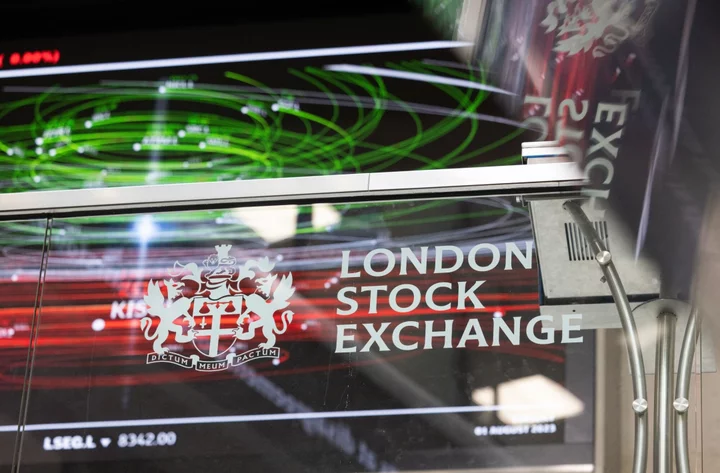President Joe Biden has spent the last week in frenzied diplomacy to prevent the Israel-Hamas war from spiraling into a broader conflict. But if those efforts fail, the US response may depend on the blunt force of its military.
The Pentagon has moved the aircraft carrier Gerald R. Ford and its battle group into the eastern Mediterranean, and the Dwight D. Eisenhower carrier strike group is on its way. Each bristles with F/A-18 Super Hornet fighter jets and other advanced aircraft. In addition 2,000 Marines have been put on heightened alert for potential mobilization.
For now, the administration says the point is to warn Hezbollah in Lebanon and other Iranian proxies against getting involved. The US has sent back-channel messages through countries such as Qatar to suggest to Iran that it’s serious about using force if necessary, according to an American official who discussed the sensitive situation on condition of anonymity.
“What the carriers and the flying squadrons give the president is options,” said retired General Frank McKenzie, who led American forces in the Mideast until 2022. “We know that Iran watches our force levels and is deterred by additional posture in the theater.”
The stakes are high and have only increased since the Oct. 7 attack on Israel by Hamas, a group designated as terrorist by the US and European Union. The conflict has already cost thousands of Israeli and Palestinian lives, inflaming tensions across the region and increasing the possibility that the conflict will escalate. Israel and Hezbollah have exchanged sporadic rocket fire on Israel’s northern border in recent days, and Iran has warned that the war’s expansion is becoming unavoidable.
Carriers’ Assets
The most potent military assets at Biden’s disposal are the aircraft carrier strike groups. The Ford probably is already assisting Israel with intelligence-gathering, but the ships have the potential to do much more.
The carriers give the US “significant striking power” in the region, said Phil Davidson, a retired four-star admiral who commanded carrier strike groups. Together, the two carriers provide about 80 aircraft with strike capabilities, as well as cruisers, destroyers and submarines armed with Tomahawk missiles, he said.
They could also help Israel defend itself. Weapon systems, such as destroyers in the battle group, “could supplement the Israeli ballistic missile defense system against the potential of Iranian medium-range ballistic missile attacks,” Davidson said.
The Pentagon put 2,000 troops on heightened alert, and defense officials say that the US Marine Corps Bataan Amphibious Ready Group and 26th Marine Expeditionary Unit, numbering more than 4,000 sailors and Marines, will join the growing American fleet off the coast of Israel.
Direct US involvement in military action also could shape voter attitudes, whether positively or negatively, as Biden prepares for a tough reelection contest next year.
No Boots
There’s virtually no discussion of a major role for US ground forces in a potential conflict.
“There are no plans or intentions to put U.S. boots on the ground in combat in Israel,” National Security Council spokesman John Kirby told reporters Tuesday. I
Still, US forces might be deployed in a number of scenarios.
One of the most serious would be a massive rocket attack on Israel by Hezbollah, which is estimated to possess about 130,000 rockets. Israel has warned that such an assault would be met with an overwhelming response, and it’s possible that US forces would be involved in any retaliation.
Biden denied an Israeli report Wednesday that the US had already told Israel that it would join the fight if Hezbollah attacked.
Hezbollah might also be tempted to target US bases or personnel in the region, as it has in the past. The group is thought to have been behind the 1983 suicide truck bombings of the US Embassy and US Marine barracks in Beirut.
Reprisals could also come from Iranian proxy groups in Iraq or Syria, which could fire rockets into Israel or even attack US troops and installations.
In that case, the US would probably follow a tit-for-tat playbook, according to Kenneth Pollack, a former CIA Middle East analyst. “If they start shooting at us, we can simply go after whoever shoots at us,” he said. In March, the US conducted airstrikes against what it said were Iranian-affiliated groups in Syria after a drone attack killed a US contractor and injured five US service members.
Uncertain Deterrence
There’s no guarantee that US deterrence will work.
Thousands of Palestinians have died as Israel carries out airstrikes on what it says are military targets, prompting protests in cities around the world. The stakes will increase if Israel goes ahead with a ground invasion that would almost certainly involve bloody street-to-street combat.
“Hezbollah is hard to deter,” said Emily Harding, a former CIA Middle East analyst. “They will look at Biden’s track record of getting militarily involved in the region and must conclude this administration has little-to-no appetite for direct military activity.”
Iran said Monday that the war’s expansion was increasingly becoming unavoidable. “The time for political solutions is running out, and the possible expansion of the war on other fronts is approaching the inevitable stage,” Iran’s foreign minister, Hossein Amirabdollahian, wrote on the social media platform X.
Still, Hezbollah may have its own reasons for not getting involved. Renewed conflict could erode its support in Lebanon, which is mired in economic crisis.
Iran also has reasons to discourage Hezbollah from pushing things too far, said Pollack, the former CIA analyst. “Iran’s whole approach is that they have a long-term strategy toward the Middle East and Israel. As far as they’re concerned, it’s working. They just need to keep at it.”
--With assistance from Tony Capaccio.









